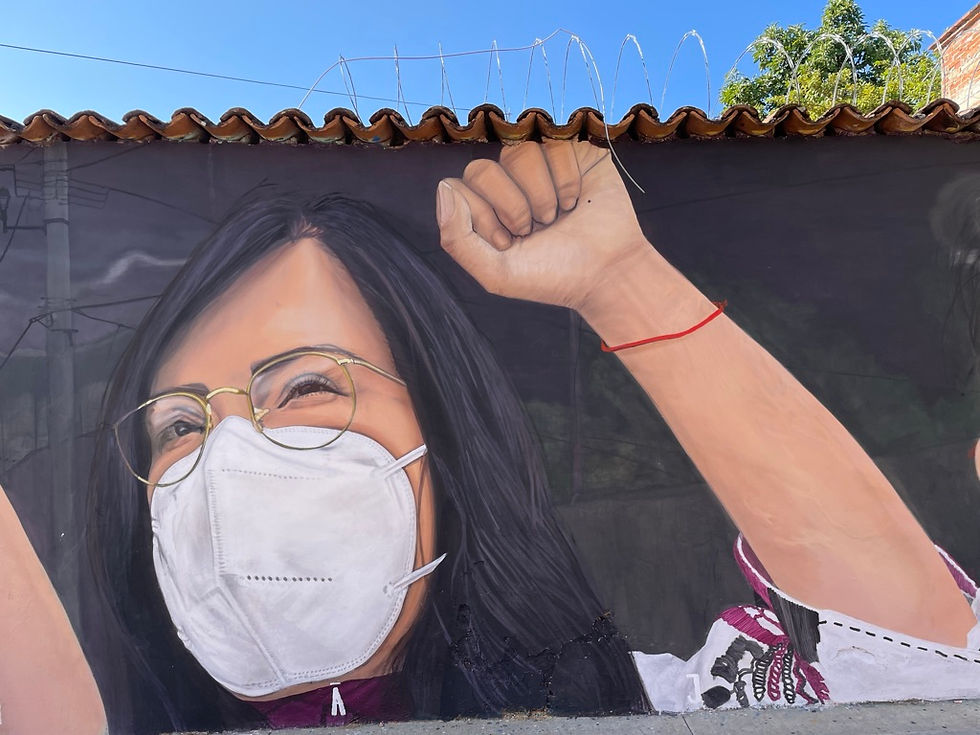
Above: a mural honoring essential/healthcare workers, Oaxaca, Mexico (Oct 2022)
COVID Conversations
One of the benefits of visiting Spanish-speaking countries is the ability to have more in-depth conversations with the locals I meet. Besides learning more about their cities and countries, I somehow started asking them how they were affected by the pandemic. In 2020-21, I gained unexpected pandemic response experience in New Mexico, where I specialized in helping our Spanish-speaking residents. Now, I find myself with a niche pandemic-related Spanish vocabulary that came in handy in these covid-convos with locals in Latin America. I got a range of answers and opinions, anything from their views of national and local governmental responses to the very personal impact it had on their families, neighborhoods and employment.
Colombia
In Colombia, I learned that people in dire need of food or household goods were asked to hang a red flag or red cloth outside their homes so that they could be easily identified by neighbors who had food they could share with them, or for government workers to deliver necessities. A significant proportion of people in Colombia work in the street economy or informal sector, including selling any range of things on the streets (think fresh fruit, prepared foods, sundries, knick-knacks, lottery tickets, used clothing, etc) or providing services. Many of these folks work every day of the week, often from dusk to dawn, to ensure that they earn enough to put food on the table at the end of the day. When the pandemic forced lockdowns, naturally, these folks completely lost their ability to be out on the streets to earn any money to survive. I came across a powerful and sad quote in a newspaper article about a local who lost their livelihood during the pandemic, "Hunger feels like sadness. It hurts."

Above: Woman from Florencia, Colombia, who lost her work cleaning houses during the pandemic. Photo by Andres Cardona (published in the Washington Post)
Ecuador & Costa Rica
Other conversations in this part of the world yielded some locals' perceptions of little to no governmental financial assistance, some temporary suspension or delay in tax payments, and delays in access to vaccinations vs other parts of the world. Several Uber drivers talked of many months of being stuck at home with no means of making a living, including not being able to pay for car payments, insurance, maintenance. Costa Rica, in particular, is heavily reliant on tourism and was understandably greatly impacted by the COVID shutdowns and restrictions. I commented to one of my drivers that I liked his car, and he proudly told me that he was just barely able to afford it during the pandemic and recently finished paying it off. It was obvious to me that he meticulously cared for his car, his livelihood.
México
Another more visual and visceral cue to the effects of the pandemic happened during my October 2022 trip to Mexico for Día de Muertos festivities. I was honored with locals' openness in visiting their loved ones' gravesites, where I quickly noticed many gravesites with death years between 2020-2022. I can safely assume that many of these were COVID-related deaths and seemed to span the age spectrum. I also came across office buildings who installed plaques or signs outside their businesses in memoriam of employees who were lost during the height of the pandemic.
Below: One of the many newer gravesites (years 2020-2022) in a Oaxacan cemetery.

Below: People coming and going from cleaning gravesites and adorning them with flowers, many still wearing their face-masks (Oct 2022).

These countries are also feeling the worldwide impact of inflation, which escalated during the pandemic. Nearly every local that I spoke with described their struggles with low and stagnant salaries while facing the significant increases in their cost-of-living. Particularly striking to me was Costa Rica, where prices for groceries, restaurant meals, and transportation were similar to those in the US, but locals described their salaries as substantially lower.
Travel, for me, is greatly enriched when I'm able to have these meaningful conversations and connections with locals. Although I capture a lot of my experiences through photos, these human connections leave impressions in my heart and mind.
コメント